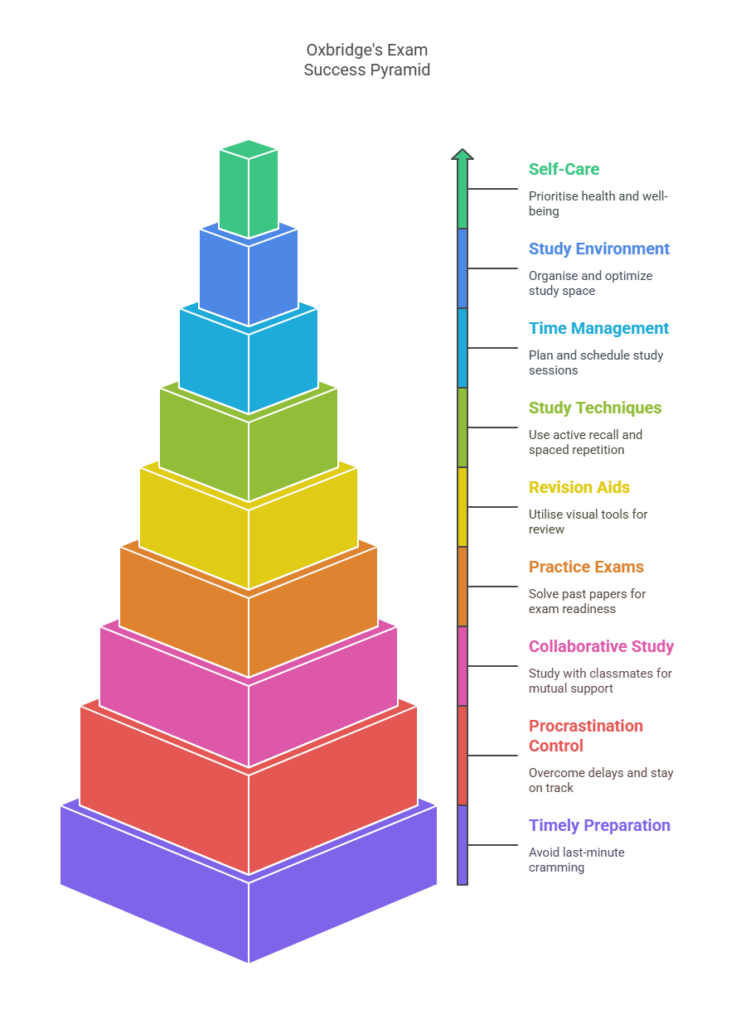Coursework deadlines, revision timetables, hours-long exams: studying is no easy ride. Of course, the career opportunities that follow are more than worth it though.
Luckily, there are ways to make it easier. If you’re struggling with your A-level or GCSE revision, our study technique tips will get you to your exam feeling fresh and ready to go. 👇
1. Look after yourself 🍎
You’ll get the most out of your study time if you feel fit and healthy. You can do this by:
- Eating healthy, nutritious foods (including ‘brain foods’ where possible).
- Drinking plenty of water to stay hydrated.
- Getting regular exercise between study sessions.
- Getting enough sleep – seven hours per night as a minimum.
Above all, you should avoid eating processed, sugary snacks while studying. These might seem like a good idea when you’re tired, but they’ll make you feel drowsy and sluggish. Keep water and a healthy alternative, like fruit or nuts, near your desk.
2. Prepare your study area 💻
Next, you should make sure your study area is clean and tidy. This will help you stay focused. Remove clutter and unnecessary distractions, such as smartphones. Always make sure you’ve got room for your books and notes.
Then, make sure that you have a comfortable, supportive chair. Sitting for long study sessions in a chair that leaves you tired and achy is not healthy. Finally, ensure you’ve got enough light so you’re not straining your eyes – consider getting a desk lamp if needed.
3. Plan your timetable 📅
It’s crucial to know when you study best. Plan your schedule around your strengths, whether you’re an early bird or a night owl. Don’t force yourself to study every hour of the day. You’ll be far more productive if you know your best time to study and schedule around it.
Use this information to make a study schedule that includes subjects, exam dates and regular breaks.

4. Break subjects into chunks 🤏
Once you’ve planned your study time, you should break each subject into manageable chunks. This step is vital – if you try to study everything at once, it’ll be confusing and ineffective.
A good way to break subjects down is by weeks of study, textbook chapters, or smaller themes. Don’t forget to review all topics, even if you know them well.
5. Active recall 🧽
Sometimes when studying, it can feel like the information is not sinking in. That’s when study techniques come in handy. A great technique is Active Recall.
Active Recall is a straightforward but highly effective study method. It aims to move knowledge from short-term memory to long-term memory through self-testing. There are a few ways to do it:
- Test yourself – leave questions on post-its around your room
- Write pop quizzes for yourself
- Train yourself – once you’ve read a section in a book, try and write down everything you remember about it.
By doing these, you’ll remember and absorb the information, not just read it.
6. Spaced repetition ⏳
Another study technique is spaced repetition. This aims to revise information repeatedly at specific intervals. The key is leaving gaps between revision sessions to let the information sink in. Reading literature on different topics back to back without a break is a form of cramming.
Spaced repetition is built on the idea that people forget old information over time. By revising study material regularly, you’ll build a stronger memory for the material. Revising the same material may sound boring, but spaced repetition is a very effective study technique.
7. Use visual revision aids 📝
Studying doesn’t always need textbooks or a computer. In fact, writing down revision notes is an excellent way of learning. You can do this in a few different ways, each helping you learn visually:
- Flashcards to help with revision and self-testing
- Mind maps of your subject
- Flow charts of information
Each of these will help you to study later on, and you’ll learn while making them. Diagrams like mind maps and flow charts are also handy for understanding relationships between aspects of your subject.
Hint: This tactic is especially helpful for courses with many subtopics like specific A-level or GCSE subjects.
8. Take past papers ✏
One of the very best revision tools, if available, is past exam papers. Not only will these give you an idea of how your upcoming exam might work, but they can highlight knowledge gaps.
Once you’re getting confident in a subject, you can also take past exams under a time limit. This way, you’ll get used to the speed at which you’ll need to write and work under pressure.
Ask your module tutor if any past exam papers are available. Some exams, such as GCSE or A-Levels, might have more than others.
9. Study with classmates 🤜🤛
Another great way to learn more about a subject is by discussing it. Meet with classmates in person or online and talk about the subject. You can test each other or help where needed. Explaining topics to other people often makes you realise you know more than you thought.
If your exam is essay or report-based, be careful that you don’t accidentally break any applicable rules when studying together.

10. Beat procrastination 💤
Sometimes it can be tough to stay motivated when studying, so here are a few tips to get you back on track when that happens:
- Take a break. Step away from your study for a while to refresh, perhaps with a walk outdoors.
- Use tools, such as the Pomodoro technique, to manage your study time. This way, you can focus for short periods with regular breaks.
- If you need to avoid distractions, turn your mobile phone notifications off.
However, sometimes you just need a rest. If you’ve got enough time, there’s nothing wrong with completely switching off for an evening – you’ll feel much more motivated the next day. Remember, procrastination is the enemy of productivity.
11. Don't leave it until the last day ⏰
Finally, you shouldn’t leave studying until the last minute. Exams can be stressful enough without leaving you with lots of cramming to do, so make sure you give yourself plenty of time.

All that's left: pass the exam!
Studying is a balancing act. You should spend a good amount of time on it, but remember to look after yourself and take regular breaks. By preparing well and managing your time, you’ll be ready for whatever the exam throws at you.
